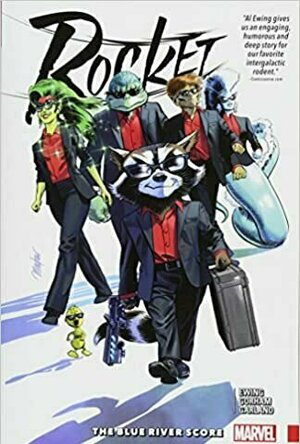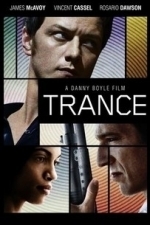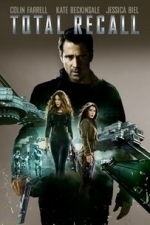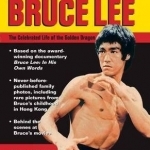
Bruce Lee: The Celebrated Life of the Golden Dragon
Book
A behind-the-scenes look at the life of the most extraordinary martial artist of all time--Bruce...

Material Alchemy: Redefining Materiality Within the 21st Century
Book
Material Alchemy has been devised to showcase the most innovative, thought-provoking design...
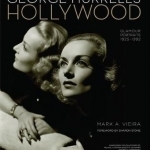
George Hurrell's Hollywood: Glamour Portraits 1925-1992
Mark A. Vieira and Sharon Stone
Book
George Hurrell (1904-1992) was the creator of the Hollywood glamour portrait, the maverick artist...
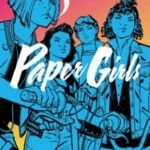
Paper Girls: Volume 1
Cliff Chiang, Brian K. Vaughan, Matthew Wilson and Jared K. Fletcher
Book
From Brian K. Vaughan, #1 New York Times bestselling writer of SAGA, and Cliff Chiang, legendary...
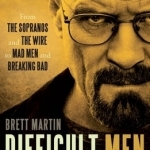
Difficult Men: From The Sopranos and The Wire to Mad Men and Breaking Bad
Book
In the late 1990s and early 2000s, a wave of TV shows, first on premium cable channels like HBO and...
Joe Goodhart (27 KP) rated Rocket: The Blue River Score in Books
Nov 30, 2020
Yes, first and foremost, it was a Rocket Raccoon story, but it was also so much more. It felt not unlike SMOKIN' ACES or SNATCH...only on another planet, with aliens and an augmented raccoon! Writer Al Ewing is clearly a fan of pulp noir novels, and it shows throughout. Ah, if only Marvel would realize what a great film this mini would make!
If you like the wise-cracking, sometimes edgy wit of RR - basically, the RR of the MCU - then this is a book for you! Rocket has a great scheme in here, as well as some good intentions, all of which amounts to a double-cross and an ending that effectively resolves everything with a somewhat bittersweet ending. Bravo, Mr. Ewing! I truly hope Marvel lets him helm another RR solo mini!
And, if that does happen, allowed for another Ewing-helmed outing with RR, I hope that brings along artist Adam Gorham and colorist Michael Garland. Those two brought this fun li'l space heist to life ever so well! I was a big fan of Sara Pichelli's GOTG art for Rocket, but as good as she was, I feel these two were just as good, if not better! Definitely artists (and colorists) to keep an eye out for!
End of the day, you could do a whole lot worse that reading ROCKET: THE BLUE RIVE SCORE. *cough* CIVIL WAR II *cough* Bendis' ALL-NEW X-MEN run *cough cough*
JT (287 KP) rated Trance (2013) in Movies
Mar 10, 2020
Simon, an art auctioneer has a problem, well he has a few in Danny Boyle’s latest mind bending heist thriller, Trance. He’s addicted to gambling and in return for wiping his debts clear he agrees to help steel the Goya painting from an auction house for Franck (Vincent Cassel) and his criminal entourage.
In an aggressive and highly charged opening sequence, which sees Simon describe various methods in which paintings have been stolen before from the smash and grab of the old school era to the more high tech, the heist is well under way.
Simon is in the thick of the action as Franck and his accomplices take charge, and as Franck is making off with the painting he’s challenged by Simon who receives a knock to the head rendering his memory practically useless.
After staggering about through all the chaos he ends up in hospital having his brain drilled and drained and any short term memory with it.
With methods of torture clearly not working the gang turn their attention to another, hypnotherapy, and seek help from Elizabeth (Rosario Dawson) who attempts to guide Simon through hypnosis in an attempt to find out exactly where he left the painting.
And so begins a journey of discovery, deceit, greed and lust as everything is not what it seems and loyalties will be tested to the fullest.
Simon’s hypnotic journey takes him through the idyllic French countryside, to a church filled with stolen paintings to the slick London underworld as he tries in vein to piece together his broken memory, but what unfolds is not what he or any of us are probably expecting.
Simon, Franck and Elizabeth are all pretty interwoven as characters, it’s almost hard to work out who is playing each other off against the other, whose dream we’re in and at what level. You’ll find that you care about all three of them in a different way when something more is revealed about them.
The remaining trio of Franck’s gang are probably around for far too long than they need to be, but are removed for the final heart pounding third act, which accompanied by a brilliant soundtrack really intensifies the finale.
Trance is written by John Hodge and he’s reunited with Danny Boyle again having previously worked together on such films as Shallow Grave and Trainspotting, where at the crux of it all they too are heist films in a different guise.
Trance is well shot, Danny Boyle is in his element directing a dark, disturbing and at times a head scratching film, I’ve not had this much fun from a Boyle film since Shallow Grave.

Subscription for Coach's Eye Premium Users
Sports and Health & Fitness
App
IMPORTANT NOTE: This IS NOT a free consumer app. This special version of Coach's Eye® is intended...
Gareth von Kallenbach (980 KP) rated Total Recall (2012) in Movies
Aug 7, 2019
The premise follows the original in only a rough sense. Sometime in the future, the world has been left mostly uninhabitable due to a deadly chemical war across the globe. Humanity has been left to residing in the only remaining habitable landmasses – Western Europe and “The Colony”, the latter being modern-day Australia. Because air travel is now impossible, the only travel between the landmasses is through a massive elevator called “The Fall” that cuts through the center of the Earth. Douglas Quaid (Colin Farrell) is a factory worker who works in Europe but lives in “The Colony” with his wife, Lori (Kate Beckinstale). His chronic nightmares lead him to become interested in the “Rekall” service – a machine that can implant memories into customers. His interest will lead him on a wild journey with Melina (Jessica Biel) to learn about his true self as well as secrets of Cohaagen’s (Bryan Cranston) tyrannical administration.
The problems of the film really start with the premise. While I enjoy the creativity of something like “The Fall”, it is simply too ridiculous to take seriously. They deserve credit for coming up with a relatively unknown science fiction concept, but an elevator that travels through the center of the Earth? Peoples’ suspension of disbelief can only be pushed so far. It serves a practical purpose in the plot – to create the conflict between “The Colony” and the mainland and between the government and the Resistance. Yet, too much time is spent trying to introduce this concept and make it seem plausible than the film should. It honestly seems easier to just use the original film’s conflict between settings – Mars and Earth. I have to ask, what makes an elevator between two lands more contemporary of an idea than a conflict between colonial Mars and Earth. This is especially true considering recent news that a Mars colony might be seen in our lifetimes.
The other problems are more literary. Colin Farrell’s Douglas Quaid is portrayed very well throughout the film, and he manages to make the character satisfactory in the emotional portrayal of a man with a confused past and an insane situation. But even then, I have to say Arnold’s original portrayal seemed overall more human. The problem with Colin Farrell’s character is a mixture of performance and writing in his introduction. It is hard to believe him as someone so distraught over his nightmares that he absolutely feels compelled to go to Rekall. If they spent more time exploring his inner demons and how they are bringing his life down, then he would have been a much more compelling character. As it stands, he just goes through the motions of a protagonist. All of the other characters are the same way. Kate Beckinstale’s villainous Lori and Jessica Biel’s Melina are fairly shallow characters. They are not bad at their roles but that is all they, unfortunately, are: roles. Like Quaid, they just go through the motions, playing their part as clichéd character archetypes. Bryan Cranston is always awesome in any role, but in this he is not given much to work with. All he ends up being is just an evil tyrant with a megalomaniacal plot – with very little reason or background.
Those issues said, there are many things that do work. The pacing is good throughout, with no moments feeling awkward. The art design is exceptional, and there are no moments in the film that are boring to look at. To its credit, almost every scene is full of beautiful science-fiction design. The only complaint in this area is that some of the action scenes feel very cluttered due to the overall noise of The Colony’s design. The plot moves forward steadily, and it is overall simple to understand. That said, it is not without its own faults. The plot starts out great but becomes full of usual secret agent thriller clichés. Also, the plot becomes very campy, not to mention unbelievable, in its third act. The third act is also where there are the most plot holes – notable plot holes at that.
If you can shut your brain off for a couple hours, you can enjoy “Total Recall”. The film is pretty to look at and is absolutely packed with action sequences. All of the action sequences are well shot, well paced, and entertaining. The actors all do great with what they are given; but the problem is that they are not given much. They are all fairly flat characters, but are all satisfactory for the service of the plot – a plot that is well paced and understandable, but one that becomes campy, ridiculous, and peppered with notable plot holes. It is not as tightly written and directed to be a great secret agent thriller, and not as inspired to be a great science fiction story. The original was exceptional in its setting construction – pulling the audience into the amazingly designed Paul Verhoeven world. It was full of comedy and thrills, thought and design. As it stands, the moments that could really go far in establishing a passionate soul-filled, inspired world are instead spent on making quick references to those vary moments from the original. It could have established its own voice, its own heart and soul, but it just settles on being your clichéd average science fiction blockbuster.
